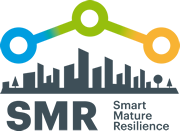Resources
PUBLICATIONS AND DOWNLOADS
Preliminary Resilience Maturity Model
Date
30/06/2016
Deliverable
D2.6
Lead Partner
TECNUN, University of Navarra
Authors
Josune Hernantes (TECNUN)
Maider Sainz (TECNUN)
Leire Labaka (TECNUN)
Raquel Gimenez (TECNUN)
Jose Mari Sarriegi (TECNUN)
Patricia Maraña (TECNUN)
Iker Zubizarreta (TECNUN)
The main aim of the SMR project is to develop a Resilience Management Guideline able to help in the operationalisation of the resilience building process of any European city. This Guideline integrates five complementary tools that will enhance significantly the ability of the European region that is exposed to natural and other hazards to resist, absorb, accommodate to and recover from the effects of a hazard in a timely and efficient manner, including the preservation and restoration of its essential basic structures and functions. These five tools are: 1) a Resilience Maturity Model, 2) a Risk Systemic Risk Assessment Questionnaire, 3) a Portfolio of Resilience Building Policies, 4) a System Dynamics Model and 5) a Resilience Engagement and Communication tool.
This report focuses on the first tool explaining the methodology used to develop it in addition to describe its maturity stages. Group Model Building workshops have been arranged during the SMR Project first year to gather from experts the needed information for the development of this Preliminary Resilience Maturity Model. Then, a Delphi process has been carried out to validate the Maturity Model.
The Preliminary Resilience Maturity Model comprises five maturity stages to guide cities through the ideal path of building resilience. Each maturity stage contains a description of the objectives of that maturity stage, the stakeholders that need to be engaged in each stage in addition to a list of policies that must be developed to achieve the objectives defined in that maturity stage. This tool will be used by local governments and other stakeholders in order to assess and classify themselves in their corresponding maturity stage. Once CITIES know in which maturity stage they are, the maturity model will help them to identify the optimal path for the evolution of the resilience building process.

This project has received funding from the European Union’s Horizon 2020 research and innovation programme under grant agreement no. 653569.

